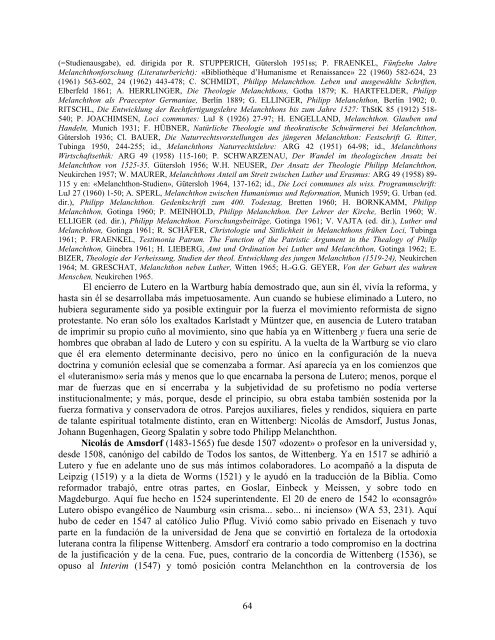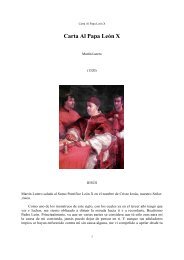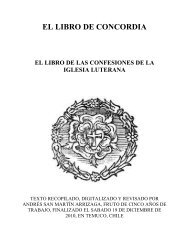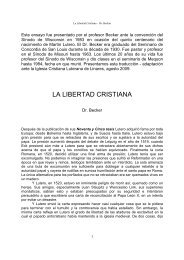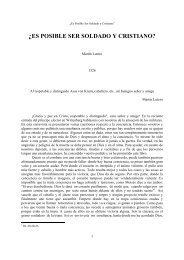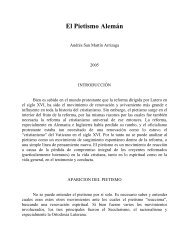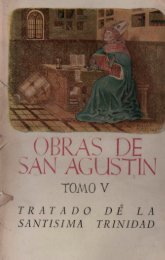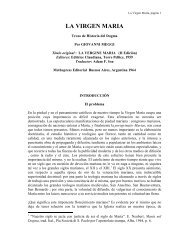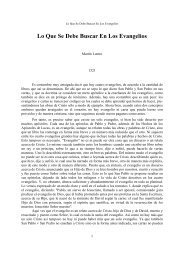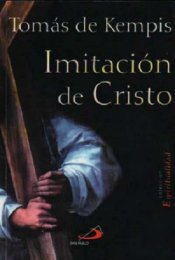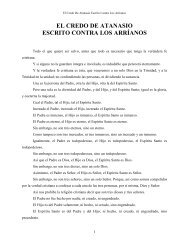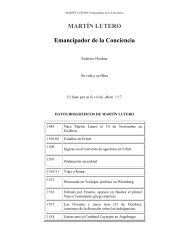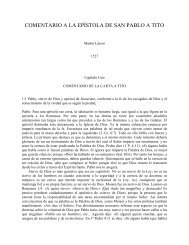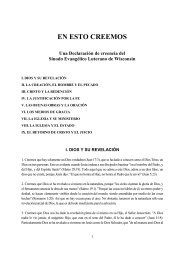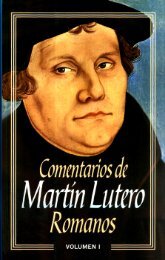martin lutero y el comienzo de la reforma - Escritura y Verdad
martin lutero y el comienzo de la reforma - Escritura y Verdad
martin lutero y el comienzo de la reforma - Escritura y Verdad
You also want an ePaper? Increase the reach of your titles
YUMPU automatically turns print PDFs into web optimized ePapers that Google loves.
(=Studienausgabe), ed. dirigida por R. STUPPERICH, Gütersloh 1951ss; P. FRAENKEL, Fünfzehn Jahre<br />
M<strong>el</strong>anchthonforschung (Literaturbericht): «Bibliothèque d’Humanisme et Renaissance» 22 (1960) 582-624, 23<br />
(1961) 563-602, 24 (1962) 443-478; C. SCHMIDT, Philipp M<strong>el</strong>anchthon. Leben und ausgewählte Schriften,<br />
Elberf<strong>el</strong>d 1861; A. HERRLINGER, Die Theologie M<strong>el</strong>anchthons, Gotha 1879; K. HARTFELDER, Philipp<br />
M<strong>el</strong>anchthon als Praeceptor Germaniae, Berlín 1889; G. ELLINGER, Philipp M<strong>el</strong>anchthon, Berlín 1902; 0.<br />
RITSCHL, Die Entwicklung <strong>de</strong>r Rechtfertigungslehre M<strong>el</strong>anchthons bis zum Jahre 1527: ThStK 85 (1912) 518-<br />
540; P. JOACHIMSEN, Loci communes: LuJ 8 (1926) 27-97; H. ENGELLAND, M<strong>el</strong>anchthon. G<strong>la</strong>uben und<br />
Hand<strong>el</strong>n, Munich 1931; F. HÜBNER, Natürliche Theologie und theokratische Schwärmerei bei M<strong>el</strong>anchthon,<br />
Gütersloh 1936; Cl. BAUER, Die Naturrechtsvorst<strong>el</strong>lungen <strong>de</strong>s jüngeren M<strong>el</strong>anchthon: Festschrift G. Ritter,<br />
Tubinga 1950, 244-255; id., M<strong>el</strong>anchthons Naturrechtslehre: ARG 42 (1951) 64-98; id., M<strong>el</strong>anchthons<br />
Wirtschaftsethik: ARG 49 (1958) 115-160; P. SCHWARZENAU, Der Wand<strong>el</strong> im theologischen Ansatz bei<br />
M<strong>el</strong>anchthon von 1525-35. Gütersloh 1956; W.H. NEUSER, Der Ansatz <strong>de</strong>r Theologie Philipp M<strong>el</strong>anchthon,<br />
Neukirchen 1957; W. MAURER, M<strong>el</strong>anchthons Anteil am Streit zwischen Luther und Erasmus: ARG 49 (1958) 89-<br />
115 y en: «M<strong>el</strong>anchthon-Studien», Gütersloh 1964, 137-162; id., Die Loci communes als wiss. Programmschrift:<br />
LuJ 27 (1960) 1-50; A. SPERL, M<strong>el</strong>anchthon zwischen Humanismus und Reformation, Munich 1959; G. Urban (ed.<br />
dir.), Philipp M<strong>el</strong>anchthon. Ge<strong>de</strong>nkschrift zum 400. To<strong>de</strong>stag, Bretten 1960; H. BORNKAMM, Philipp<br />
M<strong>el</strong>anchthon, Gotinga 1960; P. MEINHOLD, Philipp M<strong>el</strong>anchthon. Der Lehrer <strong>de</strong>r Kirche, Berlín 1960; W.<br />
ELLIGER (ed. dir.), Philipp M<strong>el</strong>anchthon. Forschungsbeiträge, Gotinga 1961; V. VAJTA (ed. dir.), Luther und<br />
M<strong>el</strong>anchthon, Gotinga 1961; R. SCHÄFER, Christologie und Sittlichkeit in M<strong>el</strong>anchthons frühen Loci, Tubinga<br />
1961; P. FRAENKEL, Testimonia Patrum. The Function of the Patristic Argument in the Thealogy of Philip<br />
M<strong>el</strong>anchthon, Ginebra 1961; H. LIEBERG, Amt und Ordination bei Luther und M<strong>el</strong>anchthon, Gotinga 1962; E.<br />
BIZER, Theologie <strong>de</strong>r Verheissung, Studien <strong>de</strong>r theol. Entwicklung <strong>de</strong>s jungen M<strong>el</strong>anchthon (1519-24), Neukirchen<br />
1964; M. GRESCHAT, M<strong>el</strong>anchthon neben Luther, Witten 1965; H.-G.G. GEYER, Von <strong>de</strong>r Geburt <strong>de</strong>s wahren<br />
Menschen, Neukirchen 1965.<br />
El encierro <strong>de</strong> Lutero en <strong>la</strong> Wartburg había <strong>de</strong>mostrado que, aun sin él, vivía <strong>la</strong> <strong>reforma</strong>, y<br />
hasta sin él se <strong>de</strong>sarrol<strong>la</strong>ba más impetuosamente. Aun cuando se hubiese <strong>el</strong>iminado a Lutero, no<br />
hubiera seguramente sido ya posible extinguir por <strong>la</strong> fuerza <strong>el</strong> movimiento reformista <strong>de</strong> signo<br />
protestante. No eran sólo los exaltados Karlstadt y Müntzer que, en ausencia <strong>de</strong> Lutero trataban<br />
<strong>de</strong> imprimir su propio cuño al movimiento, sino que había ya en Wittenberg y fuera una serie <strong>de</strong><br />
hombres que obraban al <strong>la</strong>do <strong>de</strong> Lutero y con su espíritu. A <strong>la</strong> vu<strong>el</strong>ta <strong>de</strong> <strong>la</strong> Wartburg se vio c<strong>la</strong>ro<br />
que él era <strong>el</strong>emento <strong>de</strong>terminante <strong>de</strong>cisivo, pero no único en <strong>la</strong> configuración <strong>de</strong> <strong>la</strong> nueva<br />
doctrina y comunión eclesial que se comenzaba a formar. Así aparecía ya en los <strong>comienzo</strong>s que<br />
<strong>el</strong> «luteranismo» sería más y menos que lo que encarnaba <strong>la</strong> persona <strong>de</strong> Lutero; menos, porque <strong>el</strong><br />
mar <strong>de</strong> fuerzas que en sí encerraba y <strong>la</strong> subjetividad <strong>de</strong> su profetismo no podía verterse<br />
institucionalmente; y más, porque, <strong>de</strong>s<strong>de</strong> <strong>el</strong> principio, su obra estaba también sostenida por <strong>la</strong><br />
fuerza formativa y conservadora <strong>de</strong> otros. Parejos auxiliares, fi<strong>el</strong>es y rendidos, siquiera en parte<br />
<strong>de</strong> ta<strong>la</strong>nte espiritual totalmente distinto, eran en Wittenberg: Nicolás <strong>de</strong> Amsdorf, Justus Jonas,<br />
Johann Bugenhagen, Georg Spa<strong>la</strong>tin y sobre todo Philipp M<strong>el</strong>anchthon.<br />
Nicolás <strong>de</strong> Amsdorf (1483-1565) fue <strong>de</strong>s<strong>de</strong> 1507 «dozent» o profesor en <strong>la</strong> universidad y,<br />
<strong>de</strong>s<strong>de</strong> 1508, canónigo d<strong>el</strong> cabildo <strong>de</strong> Todos los santos, <strong>de</strong> Wittenberg. Ya en 1517 se adhirió a<br />
Lutero y fue en ad<strong>el</strong>ante uno <strong>de</strong> sus más íntimos co<strong>la</strong>boradores. Lo acompañó a <strong>la</strong> disputa <strong>de</strong><br />
Leipzig (1519) y a <strong>la</strong> dieta <strong>de</strong> Worms (1521) y le ayudó en <strong>la</strong> traducción <strong>de</strong> <strong>la</strong> Biblia. Como<br />
<strong>reforma</strong>dor trabajó, entre otras partes, en Gos<strong>la</strong>r, Einbeck y Meissen, y sobre todo en<br />
Mag<strong>de</strong>burgo. Aquí fue hecho en 1524 superinten<strong>de</strong>nte. El 20 <strong>de</strong> enero <strong>de</strong> 1542 lo «consagró»<br />
Lutero obispo evangélico <strong>de</strong> Naumburg «sin crisma... sebo... ni incienso» (WA 53, 231). Aquí<br />
hubo <strong>de</strong> ce<strong>de</strong>r en 1547 al católico Julio Pflug. Vivió como sabio privado en Eisenach y tuvo<br />
parte en <strong>la</strong> fundación <strong>de</strong> <strong>la</strong> universidad <strong>de</strong> Jena que se convirtió en fortaleza <strong>de</strong> <strong>la</strong> ortodoxia<br />
luterana contra <strong>la</strong> filipense Wittenberg. Amsdorf era contrario a todo compromiso en <strong>la</strong> doctrina<br />
<strong>de</strong> <strong>la</strong> justificación y <strong>de</strong> <strong>la</strong> cena. Fue, pues, contrario <strong>de</strong> <strong>la</strong> concordia <strong>de</strong> Wittenberg (1536), se<br />
opuso al Interim (1547) y tomó posición contra M<strong>el</strong>anchthon en <strong>la</strong> controversia <strong>de</strong> los<br />
64


